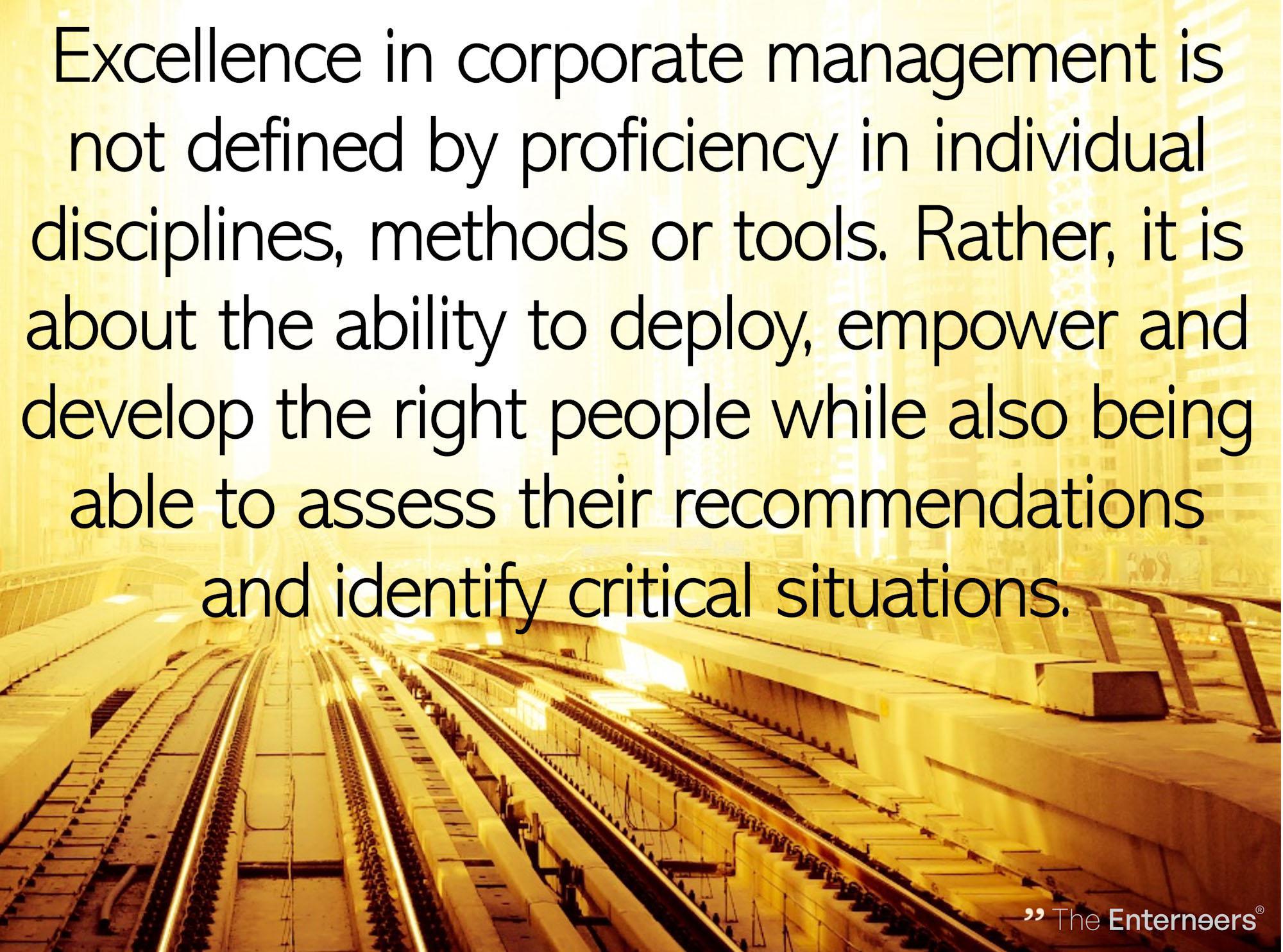Introduction
Elements of Enterneering®/Introduction
| ❮ previous | Table of contents | next ❯ |
How often do you think about how you organise your company? We are not talking about how you organise the work processes or the successful development of individual products or projects, or your market approach. It is a question of how you want the company to function as an system referring to a systemic approach. This approach aims to develop or change an overall system, instead of just optimising individual parts of it. The aim is to consciously consider the interrelationships and dependencies within an organisation and not just isolated individual processes. The human factor plays a key role in all of this. The approach involves identifying which components currently characterise your company, and how these components should be developed. Or whether new ones need to be established. At the core of these activities lies the creation of the necessary framework and foundation for successful expansion, growth and possibly, even scaling.
Entrepreneurs or top executives who fail to sufficiently and self-critically address this matter could very well find that certain parts of their company are unable to adequately keep up with growth- or change-related events, and developments on the product and market sides. If this happens, the company, shaped by its organisation and people, quickly becomes an obstacle and a limitation to sustainable business success. In the worst case, the company will no longer be able to fulfil certain contracts, performance commitments or quality expectations.
As an entrepreneur or executive with entrepreneurial responsibility, you need to be aware of the importance and core elements of the most essential pillars of a well-functioning corporate enterprise. For the content design, implementation or further development of these elements, it is not only possible but necessary to employ people with the appropriate expertise. Ideally, these people would then follow a coordinated task list or, even better, a company roadmap. If you like an agile approach, you can incorporate sprints too.
Entrepreneurs who are not familiar with the key elements of a well-functioning corporate enterprise will inevitably be unable to take well-founded decisions in this regard. They will be limited in their ability to evaluate the main elements of a roadmap. Also, they will find it difficult to identify the right people for the job, provide them with entrepreneurially-oriented management and assess their performance over time.
Enterneering® and its app are aimed at entrepreneurs, founders and executives with entrepreneurial responsibility. It is also aimed at all those who are interested in setting up and expanding companies or aspiring to develop themselves into positions of entrepreneurial responsibility. For better readability and simplification, we often have used the term ‘entrepreneur’ as a representative of all those with entrepreneurial responsibility.

The Enterneering® app is a practical and application-oriented one, intended to serve as a guide, reference book, orientation tool and training application. The app's section about the 22 elements of Enterneering® is divided into 5 chapters. In the first chapter (introduction), the topic of Enterneering® is explained in somewhat general terms. In addition, this chapter explores the different roles, tasks and perspectives of individuals with positions of responsibility in the company, emphasising their connection to Enterneering®. Chapters 2 to 4 delve into the three pillars of culture, people, and organisation as well as their respective disciplines or elements on which Enterneering® focusses. The last chapter explores the practical application of the topics discussed in the app. It offers guidance on how to implement Enterneering® in a step-by-step manner and how to embed the Enterneering® process for effective change and continuous improvement.
This app is intended to raise your awareness and provide you with valuable information about important topics related to development and expansion as well as the management of companies. It serves as an aid to insight and motivation, offering you practical guidance that you can apply. The focus is on fostering an understanding and acceptance of the role played by entrepreneurs. Entrepreneurs should have the necessary basic knowledge to deploy the best people and the appropriate tools to address key aspects in their companies. Enterneering® and its app will help you better understand cause-effect relationships, reduce complexity and structure the relevant issues. It emphasises the ability of entrepreneurs to interact with individuals in a professional way, as well as to be able to assess recommendations for action and take informed decisions.
| Recommendation for methodologists The following note is addressed to all those who attach a lot of importance to methodically and conceptually correct work and who always want to organise the developments in their working environment in a carefully structured way. At first, the term Enterneering® sounds technical, methodological or conceptual. However, considering real conditions in corporate practice, it has been demonstrated time and again that there is neither a specific methodology nor a dedicated concept for good or successful work on the company. Often, methodologists want to adapt the pure doctrine in practice. This likely results in high resistance, friction losses and implementation hurdles. It is therefore best that any doctrine is adapted to real conditions in the company. If dedicated methods or approaches are used in the implementation of individual elements, the desired success and the current circumstances should primarily decide the type and extent of the application of the respective methods, rather than the methodologically correct adaptation from the respective knowledge source. In this context, the adaptability and awareness of goal-oriented implementation are more important than the perfect application of a method. It has proven that, when applying methods or concepts, a conscious balance between acceptability and result-orientation is what is successful. A pragmatically adapted version that is implemented and subsequently accepted is more effective than a methodologically correct application that is retrospectively executed half-heartedly or rejected by relevant parts of the organisation. |
| Recommendation for doers The following advice is addressed to all those who do not like to get caught up in administrative issues and would prefer to get started directly, as well as focus on direct sales or project success. Without losing sight of the concrete operational or tactical goals, it should be accepted that strategic goals or changes can arise by chance without adequate foresight, organisational lead time and a dedicated plan. However, it is crucial to understand that these goals should be achieved through deliberate action. Neither the random principle nor the ‘postpone until tomorrow’ approach is considered a particularly successful option in Enterneering®. If an organisation wants to sell as many products or services as possible to a wide range of customers in a short period, it is important to ensure that the organisation can deliver the promised quantities and meet the expected quality after a successful sale and that it has sufficient motivated talent to do so. Otherwise, short-term successes may turn into long-term difficulties with lasting effects. |
| Recommendation for developers This note is for those who care deeply about their product and its functions, features or conditions. In most cases, in the long term, a product can only be as successful as the company that produces it. The more complex the business models become, and the more the company grows, the greater the proportion of processes and issues in the company that are perceived to be less directly related to the product and its success or even perceived to hinder product management. Apart from the fact that very few companies manufacture products solely for their own sake, the development and realisation of products should always be placed in the context of corporate strategy and the organisation. Customer proximity, product focus and speed of development are essential but not the only determinants of success. It will be useful to align one's thinking and actions according to two clients – the external client, and internal one (the company, as well as its philosophy and strategy). |
| Recommendation for administrators This note is for all those who pay close attention to effective and efficient service delivery within the organisation. Nothing is more constant than change, and yet, established and well-functioning processes and efficient systems are essential. The elements described in Enterneering® serve to empower the organisation in dealing with this perceived contradiction, among other things. It may be helpful not to see growth and change as threats. The real threat is the possible inability of one's own organisation to deal with growth and change. It is healthier and more valuable to focus one's energy and attention on successfully managing growth and change rather than on controlling or preventing them. |
| Recommendation for cost optimisers All those for whom continuous cost reduction and passionate frugality are integral aspects of daily thinking and actions are advised to deal with the definition and evaluation of the company's most significant competitive factors before seriously addressing the elements described in Enterneering®. Companies that must compete with their business models not only for customers but also for top talents in their market environment, and where employee retention and motivation are not a sure fire-success, will reach their limits with a disproportionate savings drive and permanent cost pressure in enabling their company in the sense of Enterneering®. In these cases, at the very least, the corporate and leadership culture and philosophy should be strong and be a tangible motivator and anchor for the workforce. In addition, it is advisable to review and possibly adjust one's attitude towards investments and expenditure in intangible corporate factors. |
| Recommendation for diplomats & lobbyists This recommendation is for all those for whom internal or group diplomacy tactics and networking activities, often resembling lobbying, have a major influence on their actions and decisions. Commitment and authenticity are two essential criteria for successful Enterneering®. It is therefore advisable to make a note of a few consistent red lines and guiding principles when implementing Enterneering®. These principles should serve as benchmarks for evaluation and should act as a reminder during regular self-reflection or in case of a specific need. It is worth the effort and expense to train oneself to identify and assess situations in which decisions and resolutions that have been made and communicated, or intended patterns of behaviour, are compromised in favour of day-to-day diplomacy, tactical considerations or emerging opportunities. |
The Enterneering® app describes the core elements of Enterneering® and is intended to help with the continuous development of entrepreneurs and companies. In implementing the elements of Enterneering®, the awareness of the themes and the authenticity of the acting persons in applying those themes take precedence over perfection and completeness. The successful implementation of each element requires time, continuity and some training. The Enterneering® app can be useful as an impulse generator, knowledge repository, and on-the-job training aid. It contains supplementary contributions and additional essays, as well as tools related to Enterneering®.


